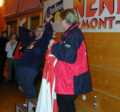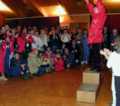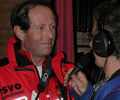|
Story and audio by Bob Merion
Photography by Bob Garypie
and Peter Ottlakan
At the end of the
day's alpine and nordic competition, small knots of
participants, team coaches, family members, and Games
organizers began filing into a spacious wood-paneled
room overlooking the Nendaz patinoire (skating rink)
for the presentation of medals from the day's events.
A reception including light snacks and drinks hosted
by the 4th Winter World Transplant Games preceded the
formal activities and afforded everyone an opportunity
to enjoy each other's company, recount the events of
the day, make new friends, and renew old acquaintances.
By 6:30pm, the room was filled to capacity. Beat Gottschalk,
Technical Director of the Nendaz Games, called for order
and began the presentation of bronze, silver, and gold
medals for men's and women's giant slalom and 3 km cross-country
ski competitions in the various age groups.
The shining medals, each engraved with the Games logo
and bearing the name of the event, were brought forward
in sets of three, attached to red and white neck ribbons
and draped on a white pillow. As each category was announced,
Gottschalk called upon one of the team managers to make
the medal presentations.
In the giant slalom, Walter Rettenegger, an Austrian
kidney transplant recipient in the senior division had
the fastest overall time of 1:23.86. The fastest woman
of the day in the giant slalom was Annemarie Moser,
a veteran division competitor from Switzerland whose
liver transplant carried her to a 1:44.25 combined time.
As each winner was announced, the crowd erupted in
spirited applause, as team members from each winner's
country tried to outdo one another's enthusiasm. The
winners came forward to appear on the three-tiered winner's
stand, bronze to the right, silver to the left, and
gold highest in the center. After bestowing the ribboned
medals and exchanging handshakes and double-cheek kisses,
each threesome stood together for recognition and photographs.
Judit Berente won the women's veteran division 3K cross-country
event. A member of 1999's World Transplant Games' Hungarian
organizing committee, she is also a kidney recipient,
and her time was 21:30.41. On the men's side, Norwegian
kidney transplant Fikse Olav, skied to a winning time
of 11:39.79.
Flags appeared and spontaneous renditions of the winners'
national anthems could be heard accompanying some of
the medal presentations.
But despite these displays of national pride, there
was a strong feeling of comaraderie in the room, as
everyone acknowledged both the individual and collective
achievements of these courageous recipients.
As the ceremony ended and everyone made their way to
the hotels for dinner, there was a comforting warmth
in the otherwise cold alpine air.
|
















